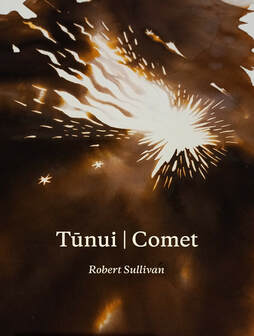
by Robert Sullivan
Most of us can’t easily be described as a natural phenomenon, but in this book, Robert Sullivan is most definitely a comet, sweeping time and place across the sky in a seamless history of ancestors and country.
His opening poem, ‘Tētahi Waerea (Prayer of Protection)’ concludes:
Yes, I speak plainly, when I hear your voice,
bringing the unseen chains of a grandfather clock
and a Polynesian paddle into the conversation.
(p. 9)
The action begins with Māui and his brothers, continues along the Great North Road and spreads out across the whole country, bringing with it all sorts: families, wars, Tahitian ships and stones, steampunk. Time begins long ago, only labelling itself first ‘With Cook’s new things...’ when
We learned to see with spectacles,
and used our own
medicines in vials ...
The trees
got to live. (‘Ah’, p 20)
And along with the poet, we learn ‘about topsails and studding sails’ and reminisce about contributing to the ‘admirals’ imperio cogito/ never-setting horizons ergo sum’ (‘i wasn’t a poet for writing placenames’, p 23). A European perspective rolls in, all set to build a Government and a House to keep it in, but – after a bit of architectural posturing – gives over to a better, foot-stomping solution:
I want to wrap Old Government House
like Christo and Jean-Claude
I want to wrap Old Govt House
in pages of the Treaty
I want to wrap OGH
in lavalavas
I want to wrap OGH
in fine feather cloaks
I want to wrap OGH
in tartans
I want to wrap OGH
in parachute silk in balloon rubber
I want to wrap OGH
in illuminated vellum
I want to wrap OGH
in four enormous kanji blankets ...
(‘Old Government House’, p 24)
The 14-part series of poems ‘Te Whitianga a Kupe’ is set in the the 250 Tuia celebrations, waka, va’a and tall ships commemorating Cook’s 1769 expedition and calling in at Whitianga (among a dozen other stops). Like the commemoration, the poems mix old and new, here and there, rock groups and reef knots.
The language the poet plays with accommodates a po-faced world ‘where education is strongly linked/ to wellbeing outcomes for all’ (H.G. Wells, p 42) and a mad world where El Cid’s corpse defends Castile on his horse Babieca, who ‘stands resolute before the people/ who struggle on.’ (‘Standing Up’, p 43).
I’ll quote the last two poems of the series in full – taken together, they give an idea of the wonderful range of this collection, both in subject matter and in word use/play. But you’ll need to get the book itself to appreciate what a splendid accomplishment the entire collection is.
13. Thousand-Faced Waka
a myriad choral voices
in the singing of the mōteatea,
the Mahabharata, the Kumulipo,
the oceanic and earthly spires
on the thousand thousand journeys
roaming the jagged ribs
of singers swimming
the ocean’s billion
billion ashes
this waka weaves
stories of bazaars
and pig husbandry
duetted by sailors
who studded
the Araby
and came
out of Pele’s
mouth (p 47)
14. Cookies
A cup of tea
a picture of the Endeavour
replica on my phone
from the beach
on my way back
and the upload
to our Five Eyes
partners
confirming
I was there (p 48)
Review by Mary Cresswell
Author: Robert Sullivan
Publisher: Auckland University Press
ISBN: 978 1 86940 969 2
RRP: $19.99
Available: bookshops

 RSS Feed
RSS Feed
